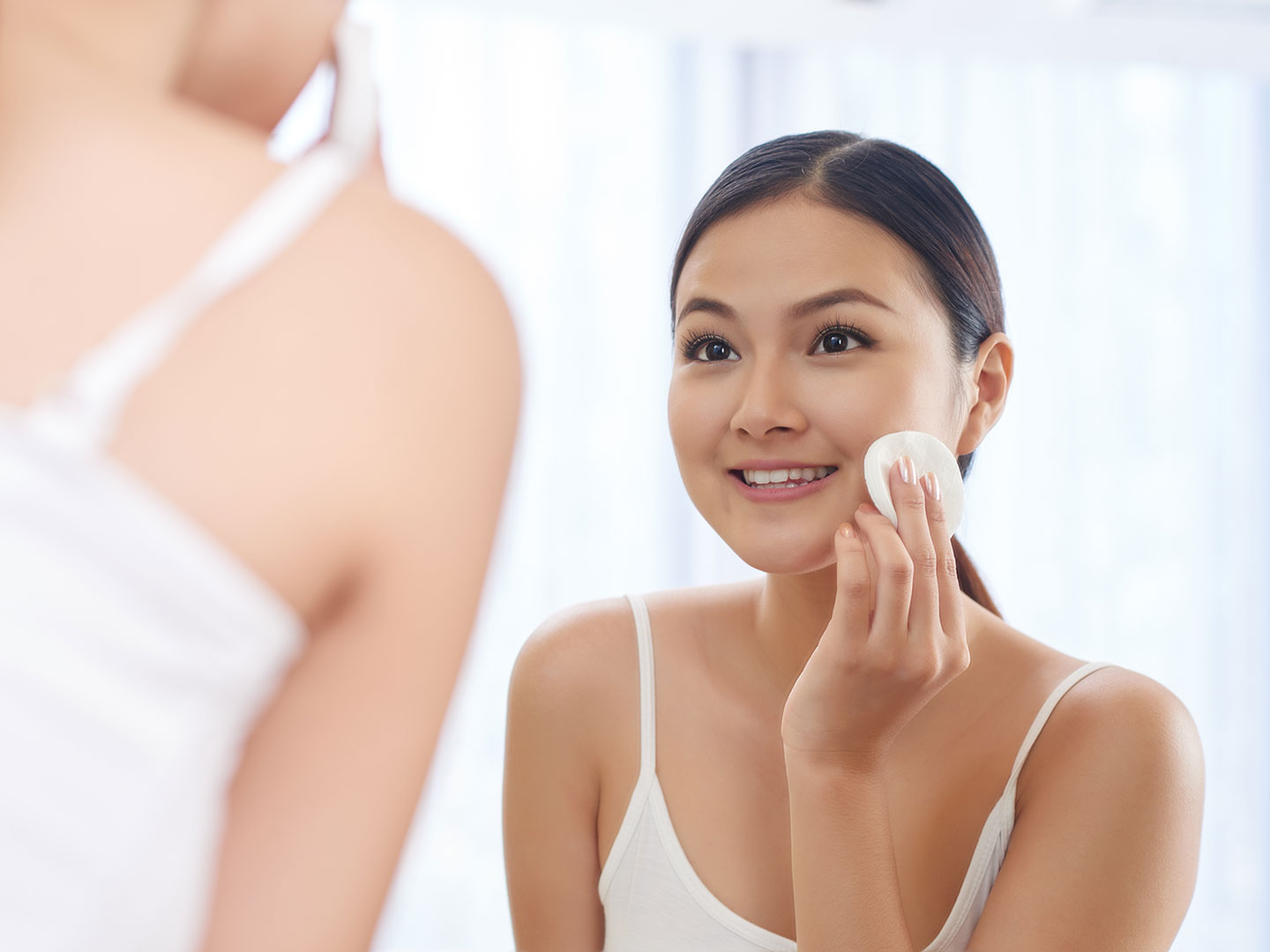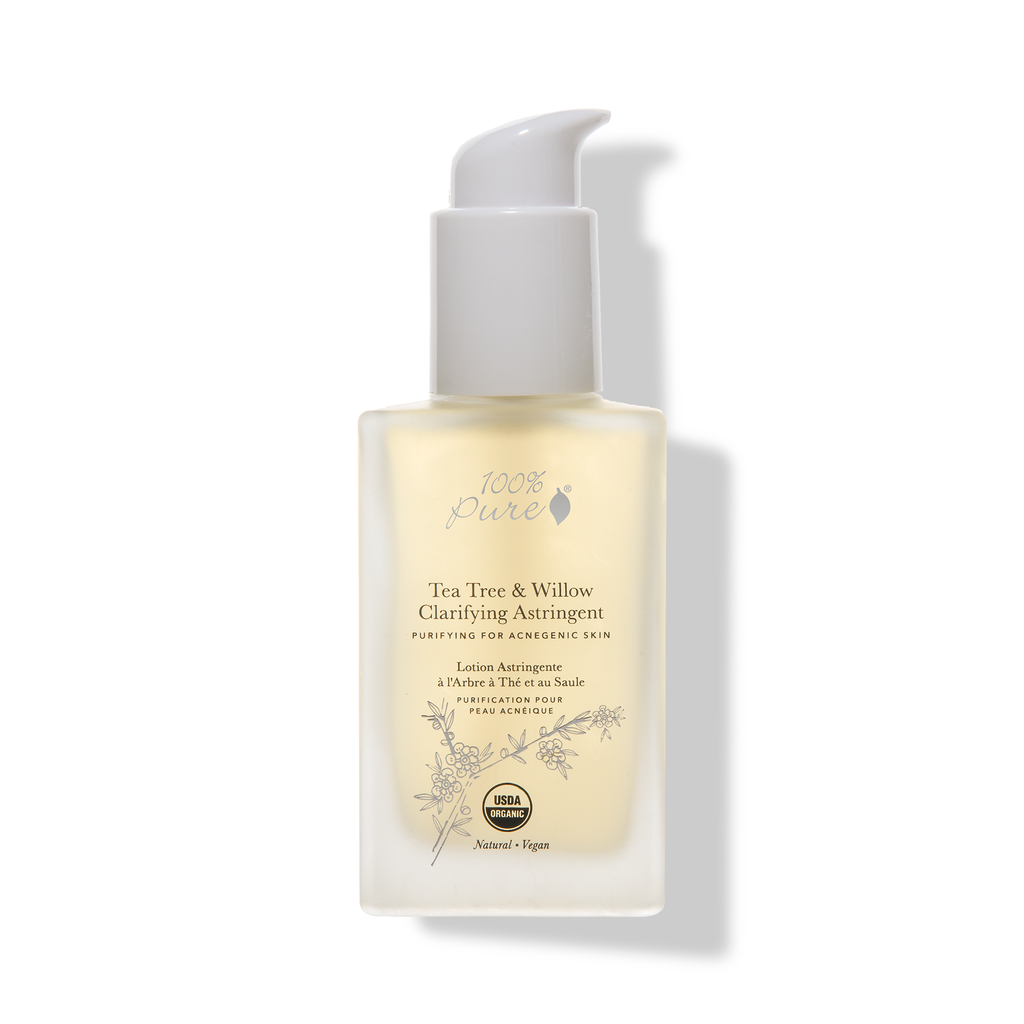What makes most sense for you to use based on your skin type and concerns.
 With skin care routines lengthening and new products constantly hitting the market, we need to keep our skin care lingo up-to-date to know what exactly we’re looking at while shopping. What’s exactly the difference between astringents and toners, and do you need to use both of these skincare products? We’ll break down the similarities and differences, and help you decide which one your skin needs.
With skin care routines lengthening and new products constantly hitting the market, we need to keep our skin care lingo up-to-date to know what exactly we’re looking at while shopping. What’s exactly the difference between astringents and toners, and do you need to use both of these skincare products? We’ll break down the similarities and differences, and help you decide which one your skin needs.
What’s an astringent?
Astringents are usually water-based products that serve the purpose of contracting your pores and lessening oil production. Traditionally, astringents are alcohol-based products that rely on alcohol to strip excess grease from oily skin. They’re usually targeted towards people with oily or acne-prone skin, and are usually applied after cleansing for an extra degreasing step. Astringents will usually have antibacterial properties too to fight acne-causing bacteria.
Many natural skin care companies are now making the move towards alcohol-free formulas that are friendly for all skin types and won’t excessively dry out skin. There are still many natural ingredients other than alcohol that have astringent properties too!
Examples of astringent ingredients
Alcohol: most traditional form of astringent that can dry out skin with overuse.
Lemon juice: degreases skin, and contains Vitamin C that helps to brighten skin.
Witch hazel: helps lessen size of pores. This plant is rich with antioxidant and anti-inflammatory properties too.
Tea tree oil: contains tannins that are plant compounds with astringent properties. Also fights acne-causing bacteria.
Astringent products
 Tea Tree & Willow Clarifying Astringent from 100% Pure
Tea Tree & Willow Clarifying Astringent from 100% Pure
This astringent contains both tea tree oil and witch hazel to really tackle a bad breakout. Its antibacterial properties help keep future breakouts at bay too. Worried about dehydrating your skin? This product contains organic glycerin and hyaluronic acid to keep your skin balanced.
Balancing Act Intensif Serum No. 2 from Wabi-Sabi Botanicals
Eager to find an astringent that works for your sensitive skin? This concentrated serum helps nourishes acne-prone skin with Omega-3 and Omega-6 fatty acids, restoring a matte, clearer complexion with gently astringent guava seed oil.
Oily + Acne Scars from Odacite
This well-loved duo from Odacite combines their astringent properties from cumin and cypress to help improve the appearance of acne-prone skin, while helping to fade the appearance of acne scars.
What’s a toner?
A toner is a multitasking product that’s water-based and used after a cleanser. It’s primarily used to provide an extra cleansing step to clear away cleanser residue, quench skin with hydrating ingredients, and balance your skin’s pH. These steps are essential for prepping your skin for the rest of your skin care products, and better absorption of potent ingredients. They’re usually targeted for all skin types, and can be reapplied throughout the day to refresh your complexion.
Examples of toner ingredients
Rose water: anti-inflammatory, skin-softening, and also hydrating. Help press reset on your skin and lessen redness and itchiness.
Salicylic acid: penetrate spores to dissolve extra buildup and acne-causing bacteria.
Willow bark: a natural source of salicylic acid.
Hyaluronic acid: a usually botanical-based molecule that helps keep skin cells hydrated, while delivering active ingredients to them.
Toner products
Willow Bark Pure Pore Toner from Andalou Naturals
A concentrated yet gentle treatment specifically targeting clogged pores, thanks to its inclusion of willow bark and salicylic acid. Eliminate grease and promote a natural glow with vitamin C and kombucha.
 Flower Water Toner from Puristry
Flower Water Toner from Puristry
This lovely skin-soothing toner packs both toning heroes hyaluronic acid and rose water into its organic formula for a light yet intensely hydrating treatment for all skin types.
Hydrating Accelerator from Josh Rosebrook
Not quite ready to add yet another product to your lengthy skin care routine? This multi-tasking products combines a toner and moisturizer all into one. Moisturize with nourishing plant oils from sea buckthorn and grape seed, while toning with a blend of herbs.
Astringent vs toner, which one is best for me?
Both products are water-based, and are optional to use on top of your usual cleansing and moisturizing routine. Toners are more commonly used nowadays because their multitasking properties are beneficial for a variety of skin types (even sensitive skin types!), and can be used daily. On the other hand, astringent products have a more targeted goal of removing excess oil from skin. That’s why we only recommend astringents to people with oily or combination skin, and to limit their use as much as possible to avoid over-processing their skin.
It’s more commonplace to see toners nowadays that contain astringent ingredients in them, so that they can tighten pores while still being hydrating pH balancers for any skin type. So if you have dry or sensitive skin, or are a beginner in skin care, we recommend sticking to a toner! They’re easy to spritz on while you’re on-the-go to soothe your skin and re-hydrate. Plus, they’re usually more gentle and suitable for a range of skin types and skin goals. Just make sure to not skip out on the rest of your routine too. Toners and astringents are there to supplement, not to replace a balanced diet, sleep, and a full beauty routine!



